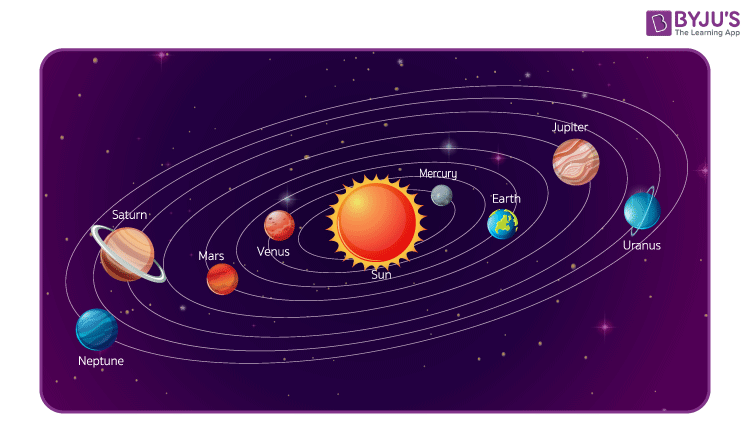What Is Planet?
The word planet means ‘wanderer’. This is because the planets do appear to wander listlessly across the night sky. The stars also move across the sky from east to west, but relative to each other, they appear fixed. The planets, on the other hand, seem to move relative to the fixed stars in backward and forward directions. This is why they were called Wanderers. We can define Planet as:
An astronomical body orbiting a star or stellar remnant that is massive enough to be rounded by its gravity, is not massive enough to cause thermonuclear fusion, and has cleared its neighbouring region of planetesimals.

A planet is a large celestial body that revolves around the sun in fixed orbits. Planets do not have any light of their own but reflect the light of the sun. Planets also do not twinkle like stars because they are much closer to us. The earth is also a planet and is the only place we know in the universe to harbour life.
Planets in Solar System
The table below lists the planets in order from the Sun.
| 1. Mercury | 5. Jupiter |
| 2. Venus | 6. Saturn |
| 3. Earth | 7. Uranus |
| 4. Mars | 8. Neptune |
Only the first five planets are visible from earth with the naked eye: Mercury, Venus, Mars, Jupiter, and Saturn. The other two: Uranus and Neptune were discovered only after telescopes were invented.
- The first four planets are made of rock with inner cores made of metal and are called rocky planets.
- The next four are made of gasses like hydrogen and methane and are huge compared to the rocky planets. These planets are called gas giants.
All planets rotate around their own axis just like the earth rotates once in 24 hours. The time a planet takes to revolve around the sun is called it’s period of revolution.
- Jupiter rotates almost once every 10 hours.
- Venus takes 243 days to rotate.
- For the earth, it is 365.26 days or 1 year to revolve around the sun.
The farther a planet is from the sun, the longer it takes to move around the sun.
What Are Satellites?
Planets have other objects that orbit them. These are called satellites. The Moon is the Earth’s satellite. Mercury and Venus are the only two planets without any satellites.
Read More: Earth’s Satellites
Is Pluto a Planet?
Until 2006, Pluto was considered a planet because it showed many characteristics of a planet. But the International Astronomical Union gave a new definition of a planet. A planet is an object that:
- Revolves around the sun.
- Has almost a spherical shape.
- Has sufficient gravity so that the space near its orbit can be free from other objects like rocks, asteroids, comets, etc.
Pluto does not satisfy the last criterion as a comet-like object clutters its orbit. Hence, it is now called a dwarf planet.
Read More: Dwarf Planet
Frequently Asked Questions – FAQs
What is a Planet?
Why don’t planets twinkle?
Which planets rotate around the sun?
What is a satellite?
Is Pluto a planet?
Try identifying the planets in the night sky. They do not appear to twinkle. Venus is very easy to see because it is very bright and can be seen before the sun rises for the first half of the year and after sunset in the other half (Be careful not to look at the sun!). If you have good binoculars or a telescope, you can also look at the satellites of Jupiter and Saturn. If you see Saturn at the right time of the year, you can also see its beautiful rings.

Good Information.
It was fun and now I also know about Dwarf planets.